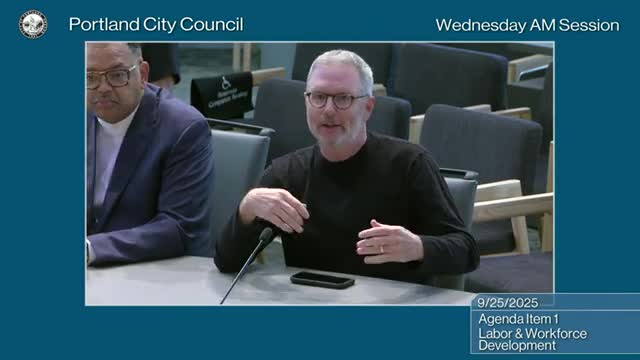Oregon Council Discusses Modular Housing Solutions Amid Affordable Housing Crisis
September 25, 2025 | Portland, Multnomah County, Oregon
This article was created by AI summarizing key points discussed. AI makes mistakes, so for full details and context, please refer to the video of the full meeting. Please report any errors so we can fix them. Report an error »

During a recent meeting of the Portland City Council Labor & Workforce Development Committee, discussions centered on addressing the pressing issue of affordable housing in the region. Council members expressed concerns about the rising costs of living and the impact on residents, particularly those in the early stages of their careers who may be forced to leave the area due to unaffordable housing options.
One key topic was the potential for developing a local industrial complex focused on manufactured housing. Councilor discussions highlighted the need for innovative solutions to lower housing production costs, which could help alleviate the housing crisis. The idea of utilizing modular and manufactured housing was brought up, with references to recent legislative efforts aimed at supporting this approach. House Bill 3145, for instance, allocates up to $50 million for modular housing initiatives, reflecting a growing recognition of the need for affordable housing solutions.
The committee also explored the importance of workforce development in the construction sector. Local workforce boards are actively engaging in construction apprenticeships and pre-apprenticeships, aiming to prepare a skilled labor force capable of meeting the demands of housing production. This initiative is seen as a critical step in addressing the housing shortage while also providing job opportunities for residents.
In addition to housing, the committee discussed the broader economic landscape, including the role of food and beverage sectors in the local economy. While some members questioned the classification of food and beverage as a traded sector, it was clarified that food manufacturing, particularly products developed for export, plays a significant role in the region's economic strategy.
As the committee continues to navigate these complex issues, there is a clear commitment to finding solutions that not only address immediate housing needs but also foster long-term economic stability and growth for Portland residents. The discussions reflect a proactive approach to tackling the intertwined challenges of housing affordability and workforce development, with an eye toward sustainable community growth.
One key topic was the potential for developing a local industrial complex focused on manufactured housing. Councilor discussions highlighted the need for innovative solutions to lower housing production costs, which could help alleviate the housing crisis. The idea of utilizing modular and manufactured housing was brought up, with references to recent legislative efforts aimed at supporting this approach. House Bill 3145, for instance, allocates up to $50 million for modular housing initiatives, reflecting a growing recognition of the need for affordable housing solutions.
The committee also explored the importance of workforce development in the construction sector. Local workforce boards are actively engaging in construction apprenticeships and pre-apprenticeships, aiming to prepare a skilled labor force capable of meeting the demands of housing production. This initiative is seen as a critical step in addressing the housing shortage while also providing job opportunities for residents.
In addition to housing, the committee discussed the broader economic landscape, including the role of food and beverage sectors in the local economy. While some members questioned the classification of food and beverage as a traded sector, it was clarified that food manufacturing, particularly products developed for export, plays a significant role in the region's economic strategy.
As the committee continues to navigate these complex issues, there is a clear commitment to finding solutions that not only address immediate housing needs but also foster long-term economic stability and growth for Portland residents. The discussions reflect a proactive approach to tackling the intertwined challenges of housing affordability and workforce development, with an eye toward sustainable community growth.
View full meeting
This article is based on a recent meeting—watch the full video and explore the complete transcript for deeper insights into the discussion.
View full meeting
